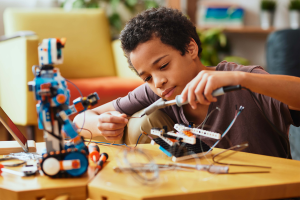Supranormal kids require a new skill set.
Typical parenting doesn’t work for them. Their siblings seem to do reasonably well with how their parents’ raise them. When Mike’s brother sent an inappropriate Snapchat and his parents took his phone away, he didn’t like it, but he understood the reason behind it and eventually accepted it. He didn’t agree with it, but he accepted it.
Normal parenting works for normal kids. With others, the same strategies just lead to frustration. They have meltdowns, or withdraw. They don’t seem as able to easily go from one activity to the next. You don’t understand why they can’t just go with the flow. You know there is something doesn’t make sense, but you can’t figure it out.
The Merriam-Webster dictionary defines supranormal as:
transcending the normal, greater than expected or usual.
That begins to make sense. You can see that your child is very good at some things. You know he or she is smart. That’s why it is so puzzling. “Why can’t he or she do _____?”
It’s like at college there are 100 level classes, 200 level, 300 level, etc. 100 level parenting works for most kids. It’s great.
Your child on the other hand, may need higher level parenting. Not only do kids not come with instruction books, but no one starts college with 300 or 400 level courses. No wonder why you feel overwhelmed. Supralevel parenting is required.
See if your child fits any of these profiles:
Steven, one of my friend’s sons, is independent.
He likes what he likes, whether it’s “cool” or not. He has friends and enjoys school, but is also happy and interested in exploring whatever is capturing his attention. One summer he became interested in rocks and minerals. That year, family adventures included gem mining or hiking along streams where he might find interesting rocks. Another year, he learned how to build electrical circuits and Lego Mindstorms kept him busy.
His parents, Rachel and Jim, love watching Steven and their other kids grow and develop their own interests. Steven seems clearly smart, engaged in the world, and we are expecting he will grow into an interesting young man.
His relationships are good enough and he is happy. He is healthy. His parents really couldn’t find anything to complain about if they tried. He doesn’t gravitate toward one child or group of kids, he is equally accepting of all of them. Teachers and other adults in his life are complimentary because he doesn’t seem to get into the normal school yard scuffles or cause problems in class.
Over time though, Rachel, his mom began to notice that he never really made a best friend or settled in with a group of friends. Steven didn’t notice, but she began to realize that he wasn’t being invited to birthday parties or to swim with neighbors.
“I’m happy he is independent and content”, she confided, but added that she also worries that he doesn’t connect with others on a deeper level. She began to worry that he was getting left behind socially.
She questioned herself why it even mattered. She explained “he is healthy and happy, I don’t know why I even worry. . “ as her voice trailed off.
Aurora is interesting and intelligent. . . but their grades don’t show it.
You can tell when you talk to them that they have a deeper understanding of things than you initially thought. Sometimes they are a little dreamy, or “spacey” as my friend Jackie calls it.
“We were at the butterfly garden and Aurora didn’t even seem to be paying attention to the guide, and then on the way home I asked what they learned. I couldn’t believe it! They walked me through the entire life cycle from egg to adult. They rattled on about their favorites and why they liked them. I guess I’ll just have to trust they are paying attention.”
Sometimes though, Aurora does miss some things and seems to take longer to fully grasp a new game or activity. Jackie is trying to get them to make more eye contact but Aurora really seems to struggle with this. Jackie knows some of this is because Aurora is unsure of whether they will be accepted. Unlike Steven, Aurora is interested in peers but always at the fringe of a group. They do well one on one, but get lost in a bigger group.
They aren’t shy exactly, it’s more that with all the activity a group just drowns them out. Then they’re irritable on the way home.
Jackie, Aurora’s mom, has three sisters and takes this irritability in stride. “Girls just come with drama and moodiness. Add on transgender hormones and it’s so much going on. It’s not like Rachel and her family of boys at all,” she explains.
What does bother her though is Aurora’s consistently low grades. “It’s like they don’t even try at school at all. She used to bring projects home because she felt like she didn’t have enough time in class. She would work for a while and I would check on her and she would have almost nothing done. Now, they don’t even bring projects home and try to tell me there aren’t any.” If I am not right there next to them, they don’t do anything. They are in 7th grade. I can’t hold their hand with projects every night!”
Mike’s teachers love him. . . At home it’s a different story.
You aren’t sure who that easy going kid is that pays attention in class and gets along with friends. Mike’s parents rave about him enthusiastically. His parents Susan and Samantha wonder “Is he even related to the one who comes home after school?” Mike does fine whenever he is on his ADHD medicine. After his second grade teacher phoned Susan every week for a month with different complaints about Mike’s behavior in class, she took him to a psychologist.
It became apparent that his behavior fit the patterns seen in Attention Deficit Hyperactivity Disorder. They started working on different parenting approaches and nutritional changes, but eventually tried medication. It made a big difference and Mike began to excel at school. Instead of fights on the playground he began to notice when peers were annoyed and stopped doing whatever the annoying thing was. Now, he has a good group of friends he spends time with.
This medication, along with some parenting strategies I helped Susan with, has worked well for years. However, now he is going through that pre-puberty stage where his hormones are changing. Somedays he interacts like an 11 year old boy, and other times you can her the depth of a 15 year old in his voice.
Now when he comes home from school, it’s another story. Susan and Mike have a reasonable first hour. They knows by now that they have to feed him a healthy snack or leave him one. If not, he gets more difficult as he gets more hungry. Even with a snack, things begin to change as early evening approaches.
Susan calls it the witching hour.
“It’s like you can watch his medicine wear off. He gets moody. Every time I ask him to do something it’s an argument. He’s messy and doesn’t even realize it. Yesterday he left a trail of Doritos bags, drink cups and candy wrappers through the house. It was like a map of how he spent his time after school. When I ask him to clean it up he gets touchy and defensive.”
Why might I consider Steven, Aurora and Mike Supranormal Kids?
I work with many parents who require a deeper look to understand what is going on.
Your child is a unique mix of strengths that come naturally, and some that require more work to develop. Sometimes parents and teachers may label your child as lazy, unmotivated, or stubborn. They may struggle with anxiety, depression, ADHD, or they may be twice exceptional. Not all kids who are twice exceptional bring parenting challenges, but it is also pretty common that a mix of strengths and developmental gaps can make them difficult to parent the way you’d like.
It’s so confusing because you see the snatches of ability that shine through, especially when they are interested in something. You and your partner may argue about it a lot.
There is a very strong possibility that something else is going on. How do we figure it out? First, we start with getting a good understanding of what you see. We also reach out to teachers or other adults your child spends time with. We meet with your child. We also recommend a good psychoeducational evaluation as a very important part of this.
Psychoeducational evaluation. I know, it’s a mouthful. This evaluation is a very thorough look at:
- what they have gained on their educational path so far,
- how they think and learn,
- your child’s natural abilities,
- how these first three interact with their personality.
A good psychoeducational evaluation includes tests (not like school tests, more like interactive activities) and interviews. Psychologists call tests “measures” because each test measures a range of different abilities. This is really important because as we look at these measures, they help us understand how your child learns and interacts in the world.
Your child is a unique pattern of strengths and challenges.
For some kids, an overall IQ score is actually misleading. Looking at each individual subtest, understanding what it measures, and how different strengths and developmental areas interact really makes a difference.
As we begin to see this range of different abilities, we see where your child’s strengths and growth areas are. It is easier to create a roadmap that will help us work with the abilities that come naturally to devise support for more difficult areas. Developing a comprehensive understanding of what is going on with your child actually reduces a lot of stress, worry, and frustration.
Imagine if instead of losing your temper because you discovered one more assignment didn’t get done you pause, understand and know what to do.
Imagine if instead of watching your child get further and further withdrawn from peers, you approach the situation differently.
Imagine if you didn’t argue with your partner about what your child needs. When you understand what’s going on, the path becomes clearer. Hope isn’t just a possibility, but something you actually begin to feel.
Can you imagine beginning to see your child succeed academically, emotionally and socially?
If you’d like to learn more, call us at 404-692-7027. We’re happy to help. Reach out to learn more 404-692-7027





